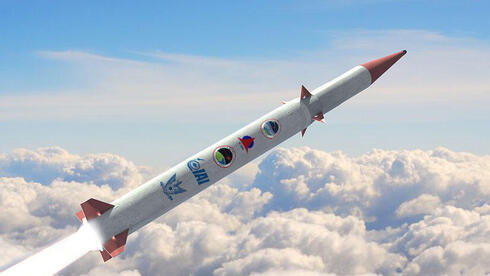
Israel orders more Arrow 3 missiles, rushes Arrow 4 to meet hypersonic threats
IAI ramps up production to strengthen missile shield against Iran.
Defense Ministry Director General Maj. Gen. (res.) Amir Baram has signed a new order with Israel Aerospace Industries (IAI) for a large-scale procurement of Arrow 3 missiles, which are designed to intercept ballistic missiles. While the Defense Ministry did not disclose the exact scope of the deal, it described the order as covering a “significant quantity” of missiles.
This move comes amid ongoing tensions between the Defense Ministry and the Finance Ministry over funding for defense procurement and the IDF’s force build-up in preparation for a potential future war with Iran. The Defense Ministry has accused the Finance Ministry of refusing to approve critical defense deals, including additional Arrow 3 acquisitions.
Arrow 3 missiles played a central role in Israel’s defense against hundreds of ballistic missiles launched by Iran during the recent 12-Day War, in which the Israeli Air Force attacked the Islamic Republic’s nuclear facilities and weapons industries.
This latest order follows another large order the Defense Ministry placed with IAI at the end of last year, worth several billion shekels. The price of a single Arrow 3 missile is estimated at $2–3 million.
Arrow 3 missiles are built to intercept ballistic threats outside Earth’s atmosphere. They are manufactured at IAI’s facilities, with engines produced by the government-owned Tomer company. Daniel Gold, head of the Israeli Directorate of Defense Research & Development (DDR&D), commented on the new deal: “The fighting in recent years has highlighted the need for a significant increase in production capacity, and advanced production technologies allow us to do this efficiently.”
IAI CEO Boaz Levy noted that, alongside ramping up production of the Arrow 3, the company is developing new systems to counter future threats, including the Arrow 4 missile. Development of the Arrow 4 has been fast-tracked in light of the ongoing conflict, which has underlined the threat posed by advanced ballistic missiles to Israel’s security.
During the 12-Day War last month, about 550 ballistic missiles were launched at Israel. According to the defense establishment, 86% of these were successfully intercepted. However, missiles that penetrated the defense system struck populated areas, killing 30 civilians and causing widespread destruction. Three missiles hit the Haifa refineries, killing three employees, causing severe damage to a power plant used in refining operations, and disrupting other activities at Bazan. Foreign reports claim that Iranian missiles also struck IDF bases, though military sources said these hits did not disrupt the IDF’s operational continuity.
Related articles:
The Arrow 4 system under development is intended to defend against increasingly complex threats, such as hypersonic missiles, which travel at more than five times the speed of sound. A test of the new missile is expected in the coming months.
Following the recent conflict with Iran and the need to replenish stockpiles, the defense establishment has stressed the urgent need for a rapid procurement push worth billions of shekels. Even before announcing this new Arrow 3 order, the Defense Ministry placed an order for thousands of new Negev 7 and Negev UX 7.62mm machine guns from IWI, the light weapons company owned by Samy Katsav, at a total cost of 67 million shekels.
The Negev UX is a new machine gun developed in cooperation with IDF units, incorporating lessons learned from combat in Gaza and Lebanon. It weighs 6.8 kg and has a firing rate of 600–800 rounds per minute, nearly half the weight of the older MAG, making it easier for troops to maneuver in combat zones. The weapon also supports the attachment of mission-specific accessories using a dedicated rail system.

